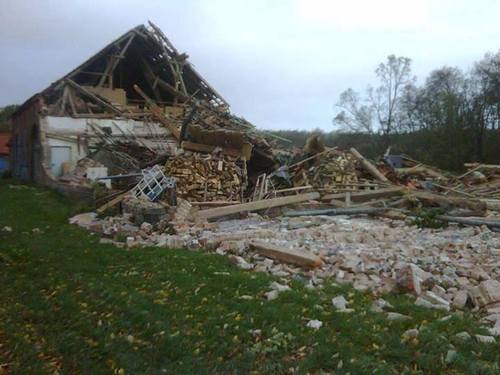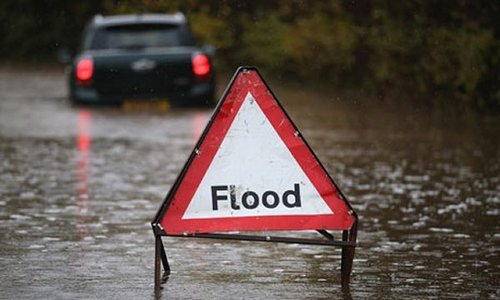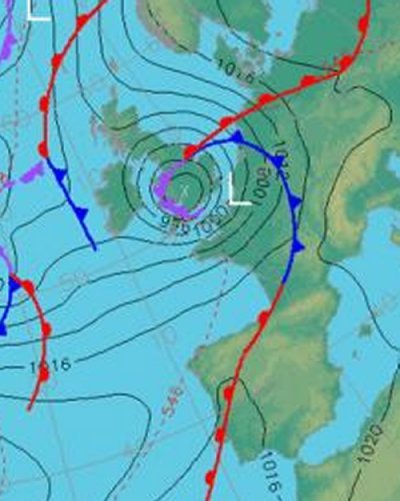After a spell of cool, uneventful weather, things are set to become a little more interesting this week. We’ll see temperatures close to 20°C many days, but it won’t be all sunshine as we’ll have to contend with a more active storm track that will bring multiple storm systems through our region. How rainy will it be, and when can we expect thunderstorms? Read on to find out…

850mb temperatures on Monday night, valid at 09Z May 1st, depicting the sharp warm front aloft present over Southern Manitoba.
We’ll see a beautiful day today with highs right around 20°C for the RRV and a fair amount of sunshine with some clouds developing in the afternoon due to some lingering instability from yesterday’s system. A low pressure system tracking it’s way into Saskatchewan through the day will be lifting warm air northwards over Southern Manitoba, and by evening, a fairly strong warm front will exist aloft, running W-E through Southern Manitoba, with a cold front draped southwards from SW Manitoba to Wyoming. A 30-40kt LLJ will help thunderstorms trigger near the triple point in North Dakota, where additional lift will aid the jet as it overrides the surface warm front.
The triple point is the location where the warm front and cold front of a system intersect, signalling the location of the surface low or the associated occlusion. Triple points are an important feature in forecasting thunderstorms as they often are areas with enhanced lift and wind shear.
The first storms will likely fire in North Dakota and begin to lift into Southern Manitoba travelling NE with the upper flow, with more developing as they do so. Once more mature, the storms will tap into the convergence present aloft in a trough extending eastwards from the low heading into Saskatchwan and continue their way across Southern Manitoba. By morning, a line of thunderstorms present over Southern Manitoba will merge into a line of rain and showers extending all the way from SE Saskatchewan all the way back to the Rocky Mountains.

Thunderstorm outlook for Monday night (April 30/May 1).
The storms are not expected to be severe, however any regions that may see multiple thunderstorms training over the area could see in excess of 20mm of rain and cool temperatures aloft raise the possiblity of marginally severe hail (which, in Canada, is about the size of a nickel). Current indications are that the greatest risk for hail would be over the south-central RRV and back into the western RRV, from the US Border to near Carmen. Other than that slight risk, no severe weather is expected from the night’s storms.
Things will continue to lift northwards on Tuesday, however we may see some afternoon showers through the RRV as a secondary system tracks through the Dakotas. Temperatures will be warm, though, with daytime highs once again near 20°C despite the cloudy skies.
Wednesday and Thursday look nice, with more sunshine and highs continuing near 20°C with overnight lows in the mid to high single digits. A powerful system is forecast to track into the region on Friday bringing with it showers and thunderstorms. It’s far to early to say with any certainty where it will end up, but we’ll keep a close eye on it through the week and provide updates.
Elsewhere in Weather News
Suspected Tornado in UK Causes Damage
Britain’s dreadful spring continues to be plagued by extreme weather as flooding, very high winds and even a suspected tornado hit the Rugby area on Wednesday, April 25. Investigations are still underway, however, most evidence does point to a tornado. A path of destruction about a mile long through the neighbourhood could be seen – sheds tossed, a roof blown off – evidence that this was a tornado and not straight-line winds. More damage was reported where telephone lines had been snapped or torn down and roof tiles scattered across yards and roads. No injuries or deaths were reported but residents were in shock as only 30 tornadoes are reported yearly across the UK.
A separate incident occurred in Essex County where severe damage was caused to a barn and house, killing the 20 chickens inside. The farmer, who was outside at the time, got picked up off the ground and threw by what he described as a tornado swirling around him. Thankfully, he survived the ordeal.

Large tree down in Rugby as a result of the suspected tornado. (Source: Diane Slater)

Roof blown off a house in Rugby by suspected tornado. (Source: Sky News)

Barn completely destroyed in Essex. (Source: Huntley/HVC)
Soggy April in UK
Britain’s odd weather doesn’t end there however. This past month, Britain has experienced very wet conditions, a big contrast from the extremely dry conditions experienced the past two winters. As restrictions are in place for water use because of the drought, UK is experiencing one of its wettest Aprils officially recorded. The main reason that they are still experiencing drought as this very soggy month moves on are for a couple reasons:
- Spring/summer rainfall doesn’t refill aquifers (underground reservoirs of water).
- Vegetation soaks up a significant amount of the rain that falls.
- Downpours don’t reach very deep underground due to the hard soil on the surface, causing water to have trouble penetrating the ground and even worse, creating lots of runoff that leads to flooding.
As of April 25th, the southern half of UK has placed 9th in all-time rainfall for the month of April since records began in 1910. With this being only 40mm off the record, they have a shot surpassing the old record before the end of the month as a strong system came ashore Saturday and is forecast to persist until at least May 1st.

On Sunday a very large area of low pressure could be seen off UK’s coast, bringing soggy conditions to most of the region. On Monday the low is expected to move slightly west, bringing another round of rain to the UK, perhaps dumping enough rain to reach the wettest April ever recorded. (Source: SAT24)
Elsewhere in Weather News is provided by Matt









